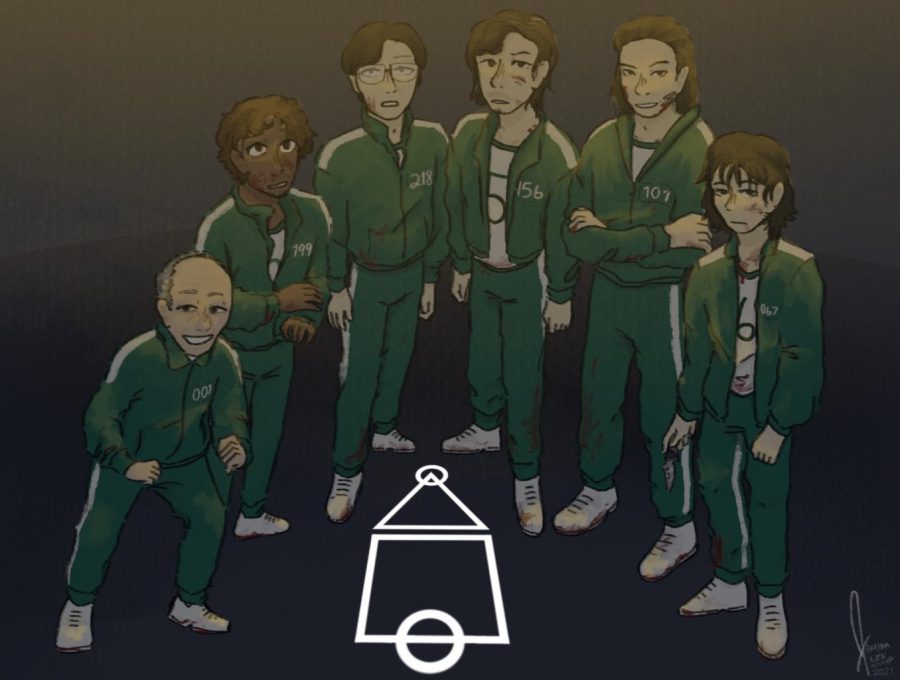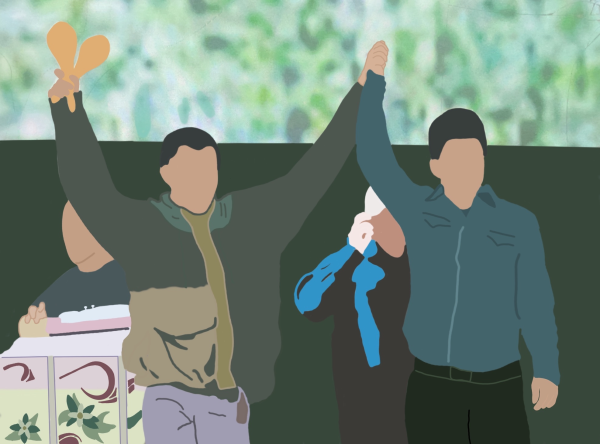‘Squid Game’s’ hidden clues, the problem with capitalism
What started out as a South Korean thriller juxtaposing children’s games with themes of late-stage capitalism transformed into a symbol of protest. On Oct. 20, South Korean protesters donned Squid Game costumes as they marched for better working conditions.
Squid game: cultural phenomenon that has captured the eyes of the world, becoming the most watched Netflix show of all time. The popularity has spurred hundreds of online debates and conspiracy theories. However, what does this say about the culture? And what are some easter eggs that you may have missed while watching this hit show?
KEY:
101 (Deok-su)
199 (Ali)
218 (Sangwoo)
067 (Sae-byeok)
001 (Oh-Il-nam)
456 (Seong Gi-hun)
The cop (Jun-ho)
Easter Eggs:
Outside World Hints:
- 101 jumps off the bridge into the water, escaping a gang after getting out of the game the first time- he fell off a glass bridge resulting in his death.
- 199 runs away and takes money from his boss after getting out of the game.
- 067 holds a knife to a broker’s neck after getting out of the game- her death resulted in 218 stabbing her in the neck.
- When in the outside world, 218 seemed as if he was going to end his life- he died by suicide in the squid game ring.
Who’s the Creator (001)?
- During the first round, 001 votes “no” because it wouldn’t be fun for him if no one wanted to participate in the deadly games.
- Met with 456 in the outside world and convinces him to join back to the games.
- When the cop opens the player books, it starts with 002 instead of 001.
- During the marble game, 001 sits in the corner because he knew the person who didn’t have a partner wouldn’t be punished.
- 001 is familiar with every game (he said that every game is his favorite) because he created them.
- 001 smiled while playing the fatal Red Light Green Light game.
- Begged for the Frontman to stop the game, and the Frontman listened to him.
- During the VIP episode, one of his hands appeared wrinkly (pointing to old age- 001 ).
- The doll did not scan 001 in Green Light Red Light.
Are 456 and 001 related?
- They meet after the first game in their neighborhood (001’s cover story explains that it was a friend’s neighborhood)
- After 456 tries to get chocolate milk, 001 asks him if he was spanked a lot as a kid, then mentioned 456 was like his son.
- During the marble game, they both said it looked like their own childhood neighborhoods.
- 456’s father isn’t mentioned in his life, only his mom.
Conspiracy Theories:
Red guards were old winners: the participants of the game were there because they didn’t have good financial skills; the winners could be back in debt after spending all of their prize money. Because of this, winners of the game would need more money, hence going back to the game (001 keeps track of them, mentioned in the end with the conversation with 456). It wouldn’t be fair if they participated back in the game, as they knew the games and how to win. At the end of the first season, 456 dyed his hair red.
Dalgona Candy:

- Hard honeycomb toffee-like texture
- Can be cut with any cutter (a circle, triangle, umbrella, square)
- Aim in the game was to poke out the shape without breaking (called Ppopgi- to pick), if they did, they would be eliminated (die).
Tools:
- Ladle
- Wooden chopstick
- Mat
- Bottom of a pot/something to press down
- Cookie cutters
Ingredients:
- White granulated sugar
- Baking soda
Instructions:
- Caramelize sugar in ladle over flame (stir with wooden chopstick) until golden light brown and melted
- Add a pinch of baking soda
- Take off flame and mix
- Pour onto mat
- Oil the presser and press
- Indent candy with the cookie cutter (do this fast before it hardens)
- Enjoy!
Analysis of the show
What started out as a South Korean thriller juxtaposing children’s games with themes of late-stage capitalism transformed into a symbol of protest. On Oct. 20, South Korean protesters donned Squid Game costumes as they marched for better working conditions.
For many, Squid Game was not only hard to watch for its violence but also for its uncanny resemblance to reality. More and more, it seems that personal well-being is put on the back burner to keep up in our hyper-competitive society. The average American works four times more hours than a worker in the 1950s for the same standard of living. Furthermore, according to the World Health Organization, in 2016 there were 745,000 deaths by stroke and heart disease due to overworking.
German poet Bertolt Brecht explains this predicament in his poem “Hollywood Elegies” where he proposes that God did not need to create a heaven and a hell. He only needed to create a heaven that was hell for the poor. That is the reality of the people who participate in the Squid Game: society is heaven for the rich but hell for the poor.
Squid Game also critiques the illusion of freedom and fair competition. By asking the participants if they wanted to continue with the game, it created the illusion of choice; however, that is not truly the case.
The only reason the game organizers offered the players a “choice” is because the organizers understood that there really was no choice. The rich are getting richer while the poor are forced to take on a second or third job to keep themselves afloat. If the players choose to not continue the game, what other options do they actually have?
It is the illusion of freedom that keeps us our own oppressors. We’d like to think that we are special and would be able to “win the Squid Game.” However, by participating in the game, we are further playing into a system designed to oppress and control us. The illusion of freedom is simply that: an illusion.
Your donation will support the student journalists of Bellaire High School. Your contribution will allow us to purchase equipment and cover our annual website hosting costs.








JL • Dec 8, 2021 at 12:02 pm
I really liked this article, as it includes some facts and theories about the show, how to recreate something from one of the games like the Dalgona candy, and a good analysis about how the show highlights the problems of capitalism and how it affects those who aren’t financially strong. Especially with the illusion of choice/freedom part, where they seem to be given a choice to not participate in the games, but they would have nothing to go back to either. This article helped me understand a bit more about the show’s messages about capitalism and unfairness.
Eledana • Dec 8, 2021 at 9:55 am
I really liked how this article was analyzed! The last paragraph was one of my favorites parts. Especially the part where it talked about how it was just an illusion of freedom. I also really liked how the second paragraph of the analysis was stated. It shed some light on how capitalism can be very harmful to the poor while the rich stay stable. The sentence talking about the number of deaths due to overworking is so important because it just shows how the system is not helpful to everyone. Overall I really did like the article and it shows how much a show about games could help us, as a society, see how much the system oppresses the poor.
Veda Manikonda • Dec 8, 2021 at 9:45 am
I agree with what the author of the article wrote. The main reason the squid game continued was because it gave the players an illusion. In some ways this illusion is comparable to guilt tripping someone. Also, I loved reading the easter eggs about the show. I didn’t know that the evidence for 001 being the creator of the game was that strong. I also didn’t understand how 067 got stabbed in the game, however, now I know that 218 stabbed her. However, I would like to pose the question that if 001 was truly the creator of the game, why would he keep on playing the games, and why would he die during the marbles game?
Atticus S Vines • Dec 8, 2021 at 9:38 am
I really enjoyed this article and I can see why this is number one on trending. This article helped me understand some things about the hints in Squid Game. Even though I have not yet seen Squid Game, I now know exactly what to look for, hidden hints and details, when watching the actual series. I already knew some of the hints because of spoilers but this article helped me understand it a lot better, and even shed some light on ones I didn’t know. This article even taught me how to make the dalgona cookies in one of the games, and now, I really want to try to make them whenever I get freetime.
Tina Hoang • Dec 8, 2021 at 9:00 am
This article is very well written with details and evidence to help the reader understand how everything connects. There are so many Easter eggs in the show that are minor details that most people would over look. The article also explains what has happened throughout the show so the people that haven’t watched it yet would still understand what is happening. The explanation in the article has helped me understand how a show can connect to real life aspects that I thought was not important or interesting.
matthew • Dec 8, 2021 at 8:57 am
The problem, I think, isn’t with capitalism, but with the individual. After getting a credit card you start in the same place as everyone else, but whether you choose to be responsible with it is your choice. Of course, problems may arise where you HAVE to pay for something like medical bills, which in the United States are often very expensive. Communism sounds like a great solution to this problem, everyone is payed the same, universal health care, and everyone is equal, but in reality none of this happened. Communism sounds great in theory, but is awful in practice. Capitalism isn’t perfect but there is nothing better than it.
Kevin • Dec 8, 2021 at 8:53 am
I think that Squid Games’ intention isn’t to make a political point but rather to just be a normal show. I feel like the player’s poverty is used more like a plot device rather to make a political point since the situation varies for each character and how they handle it reflects on their personality and each situation results in the players having no choice but to join. I feel like letting the players leave and then choose if they want to go back or not is used as a plot device to make the characters feel more reasonable and add more of a logical flow into the show. So rather than framing the characters as greedy people overwhelmed with avarice for the money, by adding the choice part, the characters seem like they have no other choice but to participate in order to avoid their fate.
(Word Count: 147)
Matthew • Dec 8, 2021 at 8:52 am
I think that this article was really well written. It compared the show Squid Game to statistic in the real world, providing examples and evidence from the text (or show in this case). It also goes deep into the idea of Squid Game, the poor and rich, and how only the rich live a good life. I also liked how the article included a few theories about the Squid Game story.
Rowan Freedson • Dec 8, 2021 at 8:49 am
Wow! I had no idea that squid game had so many hints and clues that went straight over my head. When you think about it, it becomes quite obvious that squid game includes many capitalist ideas that I hadn’t even noticed when watching the show. Soon when I get the chance to watch season two I will definitely make sure to pay attention to the more subtle hints in the show.